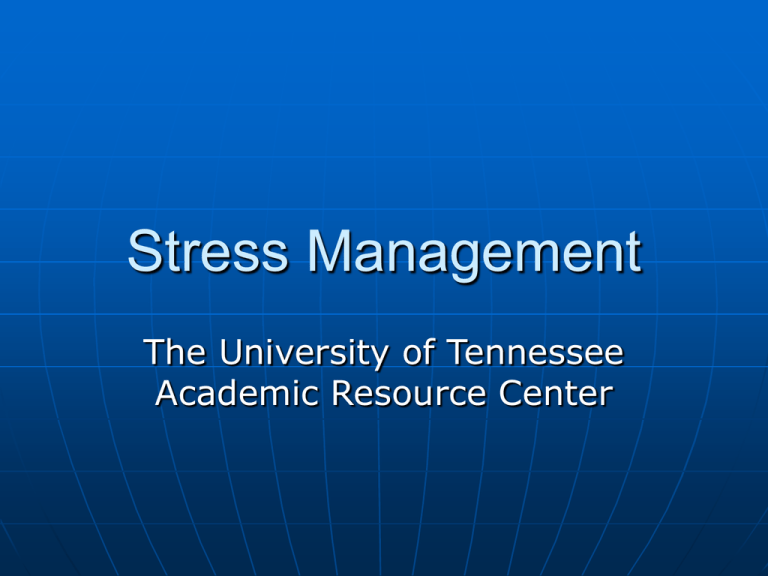Stress Management The University of Tennessee Academic Resource Center
advertisement

Stress Management The University of Tennessee Academic Resource Center Web Sites Relative to Stress www.stresstips.com www.quantadynamics.com www.stress.org www.hyperstress.com www.distress.com For additional resources including videos, relaxation tips, relaxation activities, or counseling, see the SASS director, educational specialist, or secretary What Happens When We’re Stressed? When the stress response is activated: • Our senses become increasingly alert to the threat of potential danger. • Adrenaline and cortisol, the stress hormones, flood our bloodstream to increase the body’s metabolism and overcome the effects of fatigue. • Breathing becomes shallow as it speeds up to supply increased oxygen to our muscles. • Heart rate and blood pressure are increase to rush blood to our arms and legs. • Sugars and fats and cholesterol from the liver are converted into fuel for quick energy. What Happens When We’re Stressed? • Saliva dries up and the digestion and elimination systems are stopped so blood can be directed away from our internal organs to our muscles and brain. • Muscles become tense ready for action. • Perspiration cools the body allowing it to burn more energy. • Blood clotting mechanisms are activated to protect us from blood loss in case of injury. • The immune system’s efficiency is suppressed. • The sleep process is blocked. Stress Concepts Stress in universal. (Environment, work, school, family, friends,…) Perception is a common source of stress. (encounter appears threatening) Negative feelings or bad habits may cause stress. Stress in not all bad. Stress Concepts Too much stress can be distressing. The line between eustress, that turns you on and the distress that wears you out is often difficult to distinguish. Healthful stress levels vary greatly among individuals. Stress Concepts Learn to know your signals of distress vs. eustress • 1. • 2. • 3. • 4. Listen Listen Listen Listen to to to to your your your your body… feelings… spirit… relationships… Management Strategies Stress management is a decisionmaking process. When we are under stress, there are three major ways we can deal with it. The AAAbc’s of Stress • A – alter it • A – avoid it • A – accept it b – building our resistance or c – changing our perception Management Strategies Alter = removing the source of stress by changing something. • Problem solving, direct communication, organizing, planning, and time management are common techniques for altering stress. Avoid = removing oneself from the stressful situation. • To conserve stress energy, people sometimes need to walk away, let go, say “No”, delegate, withdraw, and know their limits. Management Strategies Accept = equipping oneself physically and mentally for stress. b = building resistance • Physically– proper diet, regular aerobic exercise, and systematic relaxation techniques. • Mentally- positive affirmation, taking time for mental health, and getting clear about goals/values/priorities. • Socially- by building and maintaining support systems, investing in relationships, clear communication, and intimacy. • Spiritually- meditation, prayer, worship, faith, and commitment strengthen people. Management Strategies c = change • Change the way you perceive the situation or yourself. Changing unrealistic expectations and irrational belief is a good start. • Building self-esteem and cultivating a positive attitude. • Redefining the situation in a less stressprovoking way i.e., “isn’t it funny” or “isn’t it grand” instead of “isn’t it awful,” increases stress resistance. What Can Laughter Do For You? Gives your heart and lungs a workout Helps you relax Boosts the immune system Reduces pain Improves mood Gives a feeling of control Makes us more creative Fights depression Reduces anger Helps with chronic breathing problems Don’t Be So Serious Everyone needs a good laugh now and then. It’s free, it’s contagious, and it’s good for you! Here are some suggestions to help you add humor to your life. • Play with kids • Look at the big picture • Consider how your favorite comedian would handle a situation • Hang out with people you laugh with • Have a positive outlook • Make time for laughter Affects of Sleep Deprivation Problem solving skills are impaired. Sleep loss noticeably impairs our ability to comprehend rapidly changing situations, increases the likelihood of distraction, makes us think more rigidly, and reduces our ability to produce innovative solutions to problems. Affects of Sleep Deprivation Communication skills sufffer. Sleep loss reduced the words in one’s vocabulary both verbally and in writing, resulting in stilted conversations a greater use of cliches. Affects of Sleep Deprivation Learning and memory suffer. Research studies show that the cerebral cortex is the part of the body most affected by inadequate sleep. A direct connection has been shown between sleep loss and our abilities to concentrate and remember. Affects of Sleep Deprivation Motor skills are impaired. Numerous studies from both England and the US National Highway Traffic Safety Administration have demonstrated a direct connection between sleepiness and impaired hand-eye coordination. The degree of impairment has led researchers to compare it in severity to drunkenness. The combination of impaired judgment and diminished hand-eye coordination leads to at least 100,000 MVA’s per year in the U.S., and numerous home and industrial accidents. Affects of Sleep Deprivation Summarized net results of sleep deprivation: impaired judgment, diminished creativity and productivity, inability to concentrate, reduced language and communication skills, slowed reaction times, and decreased abilities to learn and remember. All of these will increase your stress level! Relaxation activities Keep a journal, diary, or dream notebook Play with children or animals Spend leisure time in the park Listen to quiet music Practice yoga Enjoy a snow or water sport Ride a bicycle for pleasure Run, jog, or take a long walk Eat only natural, healthy food Enjoy an aerobic sport Get or give a massage Practice gymnastics or dancing Relaxation activities Use a hot tub steam room, or sauna Work in the yard or garden Enjoy a craft of manual hobby Read for pleasure Spend time in the woods, mountains, desert, or beach Take a nap or sunbath Meditate Go hiking or camping Attend theatre, concerts, or shows Play a musical instrument or sing Practice martial arts Do breathing exercises Your favorite _____ How to Handle Stress 1. Leading cause- Change 2. Symptoms • Increased thirst • More frequent urination • Weakness • Blurry vision • Stomach pain • Nausea and vomiting • Sleeping or NOT How to Handle Stress 3. Maintain a Schedule • Daily meals • Exercise 4. Stress Management Techniques • A. Prevent it 1. Avoid unnecessary stress 2. Practice more patience 3. Control RESPONSES How to Handle Stress 4. Stress Management Techniques (continued) • B. Set goals 1. Five years 2. One year 3. Monthly 4. Weekly 5. Daily Schedule, schedule, schedule… How to Handle Stress 4. Stress Management Techniques (continued) • C. Establish priorities 1. Plan ahead 2. Make “to do” lists- in order of importance 3. Do most important- drop some • D. Take time out 1. Spend a few minutes each day alone to break routine (or socializing!) 2. Set aside time each week for recreation 3. Exercise regularly How to Handle Stress 4. Stress Management Techniques (continued) • E. Have faith (meditate, pray, worship) • F. Think positively 1. Maintain a positive attitude- give you more control 2. Negativity wastes energy 3. Practice “I can” rather than “I can’t” • G. Have a sense of humor 1. Laugh with others and at YOURSELF! 2. “He who laughs, lasts!” How to Handle Stress 4. Stress Management Techniques (continued) • H. Communicate 1. Talk over your concerns and feeling with a friend, family member, or professional 2. “Talking-it-out” relieves stress and gives you insight 3. Learn to listen and consider suggestion with an open mind. • I. Make decisions 1. Don’t resist change if it is needed 2. Make a choice and move on. How to Handle Stress 4. Stress Management Techniques (continued) • J. Get support 1. If you problems are too much to discuss with a friend or family member OR 2. You feel they would be too much of a burden- get professional assistance! 3. Remember you are NOT alone. 5. Pay attention to your physical health, motivation, and commitment to building a good emotional attitude and positive mental outlook on life! How to Handle Stress 6. Summary • Eat wisely • Consult your physician or psychologist for professional advice • Exercise regularly • Take time to rest, relax, recreate • Set goals in you life • Adapt to change • Communicate your feelings • Think positively



